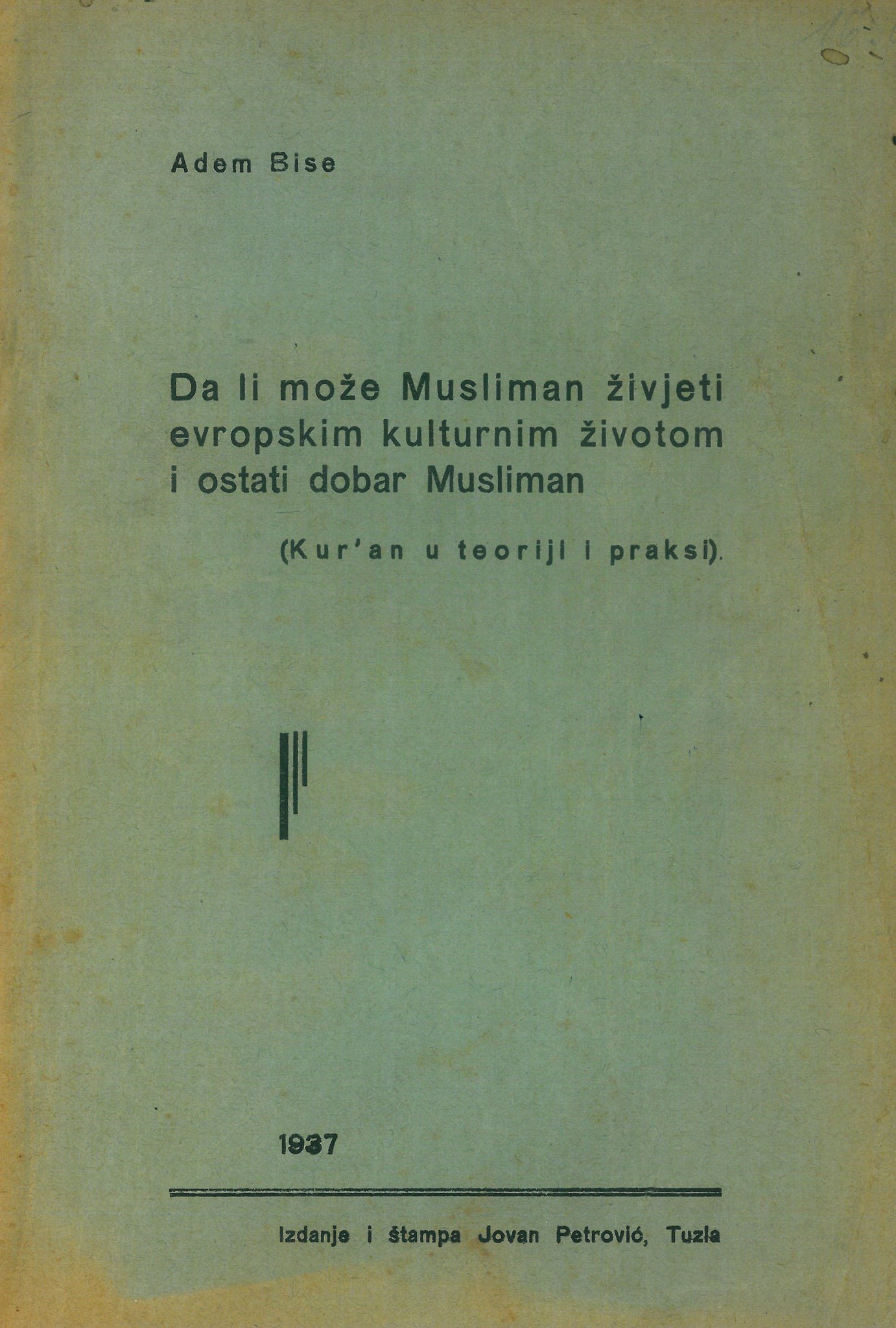
From an enlightened individual to a free society
ALIM WHO THOUGHT WITH HIS OWN HEAD
Author: Meho Šljivo, MA, Riyasat of the Islamic Community in Bosnia and Herzegovina • Illustration: Book cover Can a Muslim live an european cultural lifestyle and stay a good Muslim: (Quran in theory and practice) by Adem Bise, published in Tuzla in 1937 • Source: Gazi Husrev-beg Library

It has been almost a century since the journal Biser published a seminal text by a progressive Muslim theologist and educator Muhamed Seid Serdarević “Misliti svojom ili tuđom glavom” (To think with one's own or someone else's head).
Critical thinking about the autonomous and free human opinion as man's greatest intellectual reach which was expressed in this text was presented and supported by arguments at an enviable intellectual level similar to prominent advocates of enlightenment and reformist ideas of the modern Western European thought.
Muhamed Seid Serdarević
In the text, Serdarević primarily underscores the importance of logical, reasonable and discursive thinking, which he recognizes as a distinctive ability and feature of man. Broadminded and creative thinking is what primarily makes and should make man an intellectual being and what distinguishes him from all the other creatures. To accept opinions which are not ours, to think with someone else's head, to use “adopted” thoughts are a kind of “self-destructive” act, which is unworthy of man as a reasonable being.
Serdarević is certain that it is illusory to expect that every individual will become mature enough for his own and original thinking overnight, due to the fact that in every society there are more people “who are not good at thinking by themselves, at reasoning and drawing conclusions ...”
Serdarević's enlightening discourse is far more than idle sophistry or skill of speculation. Based on unlimited trust in broadminded human thinking, Serdarević insightfully outlines maps of democratic processes in the future: modern emancipation of man, his external and inner liberation is unthinkable without mass literacy. Although he does not believe that masses are able for independent and logical thinking, Serdarević predicts gradual extinction of the old absolutist system of governing in Muslim societies only when broad Muslim masses acquire the right to and possibility of quality education. Serdarević's arguments remind of George Orwell's thought: “In the long run, a hierarchical society is only possible on the basis of poverty and ignorance.”
This brief presentation of Serdarević's enlightenment ideas published a century ago illustrates an extremely encouraging, vivid and up-to-date philosophical-political dimension of the contemporary thinking of Bosnian and Herzegovinian Muslims. Serdarević's understanding of the social relevance and positive practical implications of creative thinking, and of thinking as such, has not lost any of its freshness.
As a rule, positive social and political changes occur only in enlightened, free and open societies. History has repeatedly convinced us that there is no truly free society without the autonomy of mind, without spiritually free citizens who are willing, to use Kant's words, to “emerge from self-imposed immaturity“” Although he does not use Qur'anic arguments to prove his theses, Serdarević's concept of the philosophy of history, of the social, spiritual, cultural and material progress is authentically Islamic and is contained in Qur'anic words: Allah will not change the condition of a people until they change what is in themselves (Er-Raʻd, 11).
It is this ayat that modernistically and reformistically oriented Muslim thinkers have mostly used as a leitmotif for the moral revival of Muslim societies, to prove the restoration potential of Muslims which they can draw from their constitutive religious sources, though only if Muslims themselves keep the open mind and the open heart for this precious “potential”.
Muhamed Seid Serdarević belongs to the avant-garde type of Bosnian ulama, who understood progress as a dynamic and comprehensive process of man's rational encounter with the world that surrounds him. Instead of adhering to the static and anachronous notions of historical and civilizational developments that made Muslims intellectually inferior objects of the world's political trends and changes, it was necessary to open a new chapter of Muslim critical thinking in the modernity as a prerequisite for all-Muslim and general people's awakening and disillusionment.
Moreover, Muslim intellectual elite had already reconciled with the status of an outsider in the political life, which is eloquently shown by the defeatist statement by Muhammad Iqbal: “We, Muslims, as a political force may no longer be necessary, though I believe that we are still irreplaceable in the world as the only testimony of the Absolute God's Oneness.”
The reminder of the great enlightening thinking of a Bosnian and Herzegovinian Muslim scholar which arose at the climax of the colonial rule of Western European states in the most populous countries with Muslim majority can be an impetus for all those who believe in the power of mind and, consequently, in the liberating power of great teachings and ideas.
Against great and libertarian ideas, we typically find lifeless and heavy-handed ideologies which, by discovering the “golden past”, underestimate the present and mock at the future.
In the first decades of the 20th century, Serdarević invited Muslims, lulled in the Messianic hopes and dreams and intoxicated with the „golden past“, to think with their own heads, same as Erasmus of Rotterdam, a few centuries before, provoked his contemporaries, blind supporters of Christian scholasticism, with the picturesque aphorism: „If all the people's heads were cut off and rolled down a slope, everybody would run after his own head.“ Do Muslims today think with their own heads, and to what extent?! Do they watch and observe their overall reality, multifaceted crises and challenges with two eyes – zu-l-ajnejni? Watching with two eyes requires willingness to create a balance between all extremisms, and mental balancing between opposed extremes means avoiding fanatism and reductionism.
British-Pakistani Muslim scholar Ziauddin Sardar sets another essential requirement for today’s Muslims who have not given up planning for the future: get rid of provincialism – a widespread characteristic of Muslim thinking.
Rather than fixing their mind only to fiqh (Islamic law), and following what is dictated by one or another school of thought, Muslims must dare to think imaginatively, bravely and universally.
Islam is a universal worldview. Since any national, ethnic, language, racial or other boundaries are alien to it, Islam is not “restricted by a provincial and closed view of the world”.
It was best known by Muhamed Seid Serdarević who, despite the omnipresent retrograde and reactionary influences and scriptural readings of the sources of religion, bravely and inclusively thought with his own head, believing that such thinking will become the basis of Muslim revival and gradual acquisition of political freedom.

